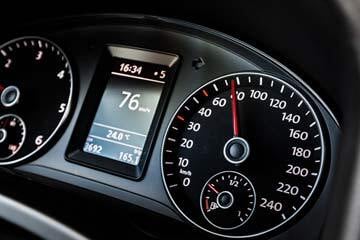The new vehicle excise duty (VED) tax rates for 2024/2025 are here. The standard rate for VED* has risen by £10 to £190 per year.
First year VED* tax rates have also increased by up to £140 for some vehicles. VED tax costs for cars registered before April 2017 are also rising by up to £40.
Here are the new rates for 2023/2024 and our answers to common questions on car tax.

VED tax rates for tax year 2024/25
These are the first year VED rates for cars registered on or after 1 April 2024:
| C02 emissions (g/Km) | Petrol and clean diesel (£) first year rate | £ change since 2023/2024 | Standard rate | £ change since 2023/2024 |
|---|---|---|---|---|
|
0
|
0
|
0 |
0
|
0 |
|
1-50
|
10
|
0 |
190
|
10 |
|
51-75
|
30
|
0 |
190
|
10 |
|
76-90
|
135
|
5 |
190
|
10 |
|
91-100
|
175
|
10 |
190
|
10 |
|
101-110
|
195
|
10 |
190
|
10 |
|
111-130
|
220
|
10 |
190
|
10 |
|
131-150
|
270
|
15 |
190
|
10 |
|
151-170
|
680
|
35 |
190
|
10 |
|
171-190
|
1095
|
55 |
190
|
10 |
|
191-225
|
1650
|
85 |
190
|
10 |
|
226-255
|
2340
|
120 |
190
|
10 |
|
Over 255
|
2745
|
140 |
190
|
10 |
After the first year, all petrol and diesel cars registered after April 2017 have to pay a flat fee of £190 a year. This is up from £180 in 2023/2024.
For petrol and diesel cars priced over £40,000, there's an extra £390 to pay on top of the first year rate. Drivers have to pay this on the second and sixth year of ownership on top of the standard VED rate.
VED tax cost for cars registered before April 2017
For cars registered before April 2017, the car tax scale splits into 13 bands (A to M). Here are the new tax rates for these vehicles:
| Band | C02 emissions (g/Km) | Petrol and diesel(£) | £ change since 2023/2024 |
|---|---|---|---|
|
A
|
Up to 100
|
0
|
0 |
|
B
|
101-110
|
20
|
0 |
|
C
|
111-120
|
35
|
0 |
|
D
|
121-130
|
160
|
10 |
|
E
|
131-140
|
190
|
10 |
|
F
|
141-150
|
210
|
10 |
|
G
|
151-165
|
255
|
15 |
|
H
|
166-175
|
305
|
15 |
|
I
|
176-185
|
335
|
15 |
|
J
|
186-200
|
385
|
20 |
|
K*
|
201-225
|
415
|
20 |
|
L
|
226-255
|
710
|
35 |
|
M
|
Over 255
|
735
|
40 |
* This includes cars with a CO2 figure over 225g/km but were registered before 23 March 2006
What tax band is my car in?
To find out which car tax band you’re in visit the GOV.UK website. You can find the emissions of both new and used cars.
You can also check your vehicle tax status using our car tax checker tool.
VED changes for EVs
In 2025, electric vehicle owners have to pay car tax.
Electric cars don’t pay VED tax or fuel duty now. Fuel duty is a tax that’s part of the cost of petrol and diesel. As EVs become more popular, fewer people pay these taxes.
So in 2025, the government is introducing a tax on EVs in an attempt to make up the £35 billion in tax revenue that could be lost.
What cars are exempt from paying VED?
You’re exempt from paying VED if your car is:
- Fully powered by electricity (until 2025)
- More than 40 years old
- Used by a person who has an eligible disability
- Used by an organisation that provides transport for people who have an eligible disability
- An agricultural vehicle
- Has a Statutory Off-Road Notice (SORN) attached to it
Even if you're exempt from paying VED, you still need to tax your car.
VED tax and car insurance
You can't tax your car if you don't have car insurance. When you apply for tax, the DVLA checks whether your car has a valid MOT and insurance. If it doesn't you can't tax your car.
If you don't pay your car tax you could get an £80 fine (or £40 if you pay it within 33 days). If you’re stopped by the police and they discover you haven’t paid your car tax they could issue you with a fixed penalty notice of £1,000. The DVLA can also clamp your vehicle if it finds you haven't paid your car tax.
And if you don't have valid car insurance, you could face even tougher measures. So before you tax your car, check your car is insured.
If you sell your car and cancel your insurance, you'll also be eligible for a car tax refund depending on how many months of remaining tax you've already paid for.
Compare car insurance quotes
*Figures taken from What Car? https://www.whatcar.com/advice/owning/how-much-is-car-tax-ved-rates-explained/n1153







